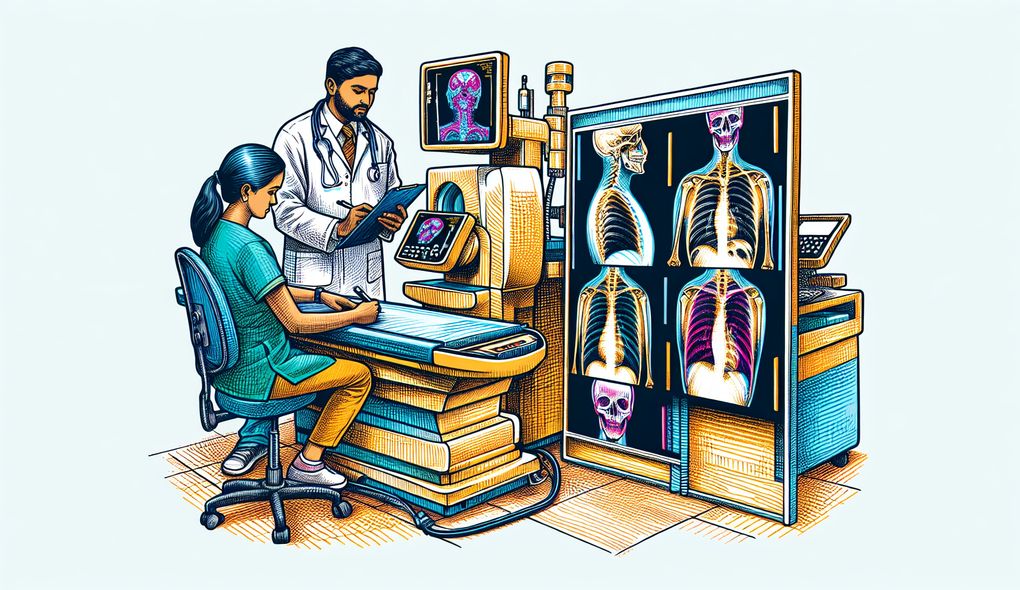Describe a time when you had to manage conflicting priorities within a radiology department.
SENIOR LEVEL

Sample answer to the question:
In a radiology department, conflicting priorities can often arise due to the urgent nature of patient care. One time, I had to manage conflicting priorities when I received a request for an emergency CT scan while simultaneously being asked to assist with a radiographic procedure for another patient. I quickly evaluated the situation and prioritized the emergency request, as it was critical for the patient's immediate care. I informed the radiologist about the situation and reassured them that I would assist them as soon as possible. I immediately contacted the CT technologist to ensure the scan was scheduled promptly. Once the emergency was dealt with, I promptly facilitated the radiographic procedure for the other patient, ensuring all necessary steps were followed. By effectively managing conflicting priorities, I prioritized patient care and ensured both patients received the necessary attention in a timely manner.
Here is a more solid answer:
Managing conflicting priorities within a radiology department requires a combination of strong technical skills and effective communication. In one instance, I was confronted with conflicting priorities when a radiologist requested an immediate MRI scan for a critically ill patient while another radiologist needed assistance with a complex ultrasound procedure. With a calm demeanor, I assessed the situation and quickly coordinated with the MRI technologist to rearrange the schedule and accommodate the emergency scan. Simultaneously, I informed the second radiologist about the situation and assured them that I would assist as soon as possible. While managing the MRI scan, I paid meticulous attention to patient positioning, safety, and image quality, ensuring a successful outcome. Once the emergency scan was completed, I immediately joined the second radiologist and efficiently facilitated the ultrasound procedure, providing necessary support and maintaining a high level of accuracy. Throughout the process, I ensured effective communication between all team members and promoted a collaborative and cohesive environment.
Why is this a more solid answer?
The solid answer expands on the basic answer by providing specific details of how the candidate managed conflicting priorities within a radiology department. It demonstrates the candidate's ability to work well under pressure, attention to detail, and their leadership and team management abilities. However, it can still be improved by providing more examples of how the candidate showcased these skills.
An example of a exceptional answer:
Managing conflicting priorities within a radiology department is a complex task that requires a combination of technical expertise, critical thinking, and effective communication. In a recent scenario, I encountered conflicting priorities when I received an urgent request for a fluoroscopy procedure while simultaneously being called upon to assist with a complicated interventional radiology case. Recognizing the need to address the time-sensitive nature of both situations, I swiftly assessed the patients' conditions and informed the interventional radiologist about the urgency of the fluoroscopy procedure. I then coordinated with the fluoroscopy team to prioritize and expedite the procedure, ensuring patient safety and procedural accuracy. Simultaneously, I collaborated with the interventional radiologist, providing guidance and support during the intricate case, applying my extensive knowledge of radiology practices and procedures. Throughout the process, I maintained open lines of communication with all team members, facilitating a seamless workflow and prioritizing patient care. In the end, both patients received the required attention and care within the necessary timeframes.
Why is this an exceptional answer?
The exceptional answer provides a comprehensive and detailed response to the question. It showcases the candidate's ability to manage conflicting priorities within a radiology department by applying their technical expertise, critical thinking skills, and effective communication. The answer demonstrates the candidate's commitment to patient care, team collaboration, and their ability to make informed decisions under pressure.
How to prepare for this question:
- Familiarize yourself with the radiology department's standard operating procedures and protocols to understand the workflow and potential areas of conflicting priorities.
- Develop strong technical skills with various radiology equipment to enhance your ability to manage multiple tasks efficiently.
- Practice effective communication and interpersonal skills to collaborate with the radiology team and other healthcare professionals during conflicting priority situations.
- Sharpen your problem-solving skills by seeking opportunities to handle challenging and time-sensitive scenarios.
- Stay updated with emerging technologies and procedures in radiology to adapt and manage conflicting priorities effectively.
What are interviewers evaluating with this question?
- Ability to work well under pressure and in fast-paced environments
- Attention to detail and high level of accuracy
- Leadership and team management abilities

